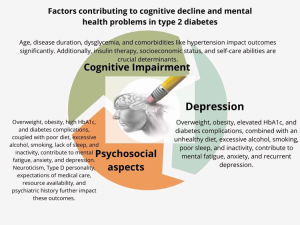Exploring the Intersection: Type 2 Diabetes and Its Influence on Mental and Psychosocial Well-Being: Mini Review
Main Article Content
Abstract
This systematic review examines the common risk factors associated with cognitive impairment, depression, and psychosocial issues in individuals with type 2 diabetes (T2D), aiming to highlight the interrelated aspects of these conditions. Recognizing the elevated risk of cognitive disorders, including dementia, and their subsequent impact on hospitalization, falls, and premature mortality in T2D patients, we meticulously searched electronic databases for relevant studies published from 2016 onwards, complemented by manual searches in leading journals. Out of the initial pool, we are focusing on biological, psychological, social, and pharmacological determinants leading to neuropsychological complications in T2D.
The analysis revealed consistent risk factors across cognitive impairment, depression, and psychosocial challenges, including comorbid conditions, dysglycemia, sex differences, elevated anxiety levels, educational and socio-economic status, and medication effects. Notably, disease duration, obesity, and age were underscored as significant contributors to both cognitive and depressive disorders. The lack of a strong support network further emerged as a pivotal risk factor, exacerbating psychosocial and depressive symptoms. These findings underscore the complexity of T2D management, highlighting the necessity for comprehensive care approaches that incorporate psychosocial support, patient education, and tailored treatments. This review emphasizes the importance of addressing multifaceted risk factors to enhance the overall outcomes and quality of life for individuals with T2D.
Article Details

This work is licensed under a Creative Commons Attribution 4.0 International License.
